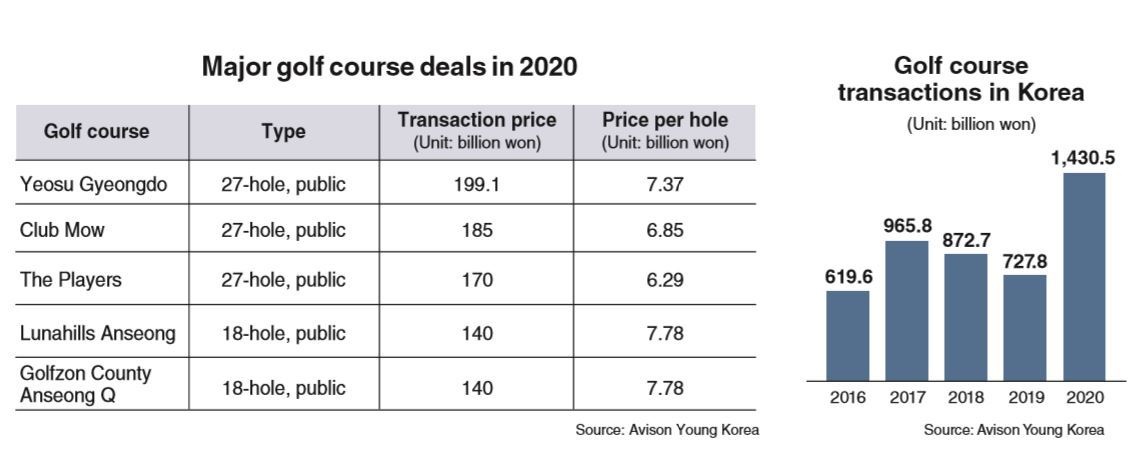
A view of Golfzon County Anseong Q (Courtesy of Anseong Q)
South Korea‘s golf courses are carrying heftier price tags as investment destinations than ever, and their transactions are becoming more and more active, as the coronavirus pandemic since last year has opened doors to more golfing activities and investors are scrambling for more attractive options for their real asset investments, data showed Sunday.
The total investment transaction volume of Korean golf facilities in 2020 reached an all-time-high, rising twofold year-on-year to 1.43 trillion won ($1.27 billion), with the priciest course to be transacted fetching 7.8 billion won per hole, according to data from real estate consulting firm Avison Young Korea.
Market watchers say the bidding battle surrounding golf courses intensified as institutional investors behind real asset fund managers have started to venture into the new asset class over the past few years.
“Institutional investors began to pursue their financial return from golf courses by purchasing them through private real estate funds,” Lee Hyoung-goo, head of research at Avison Young Korea, told The Korea Herald.
“On the other side, some golf course owners in need of cash were taking advantage of this upbeat market sentiment.”
The priciest golf courses transacted in 2020 were Lunahills Anseong Country Club, formerly known as Anseong Arden Hill, and Golfzon County Anseong Q, each priced at 140 billion won. Both located in the Greater Seoul area, they each have 18 holes and were acquired by groups led by financial investors Melon Asset Management and IGen Investments, respectively.
By transaction size, Mirae Asset’s intragroup transaction of Yeosu Gyeongdo Golf & Resort located on an islet in Yeosu, South Jeolla Province, with its 27-hole course was the largest deal, with a 199.1 billion-won valuation. This was followed by the 27-hole Club Mow Country Club‘s transaction for 185 billion won and the 27-hole The Players Golf Club for 170 billion won, both located in the mountainous Gangwon Province.
All five clubs were golf courses open to the public.
While golf courses are enjoying a new heyday amid the country’s golf boom coupled with travel restrictions, financial professionals were mixed as to whether the pricing of golf courses has peaked.
“It appears that the price has recently gone up sharply, so we need to see if the demand would continue to remain strong as it is now over the next two or three years,” Lee said.
But from a dealmaker’s perspective, investors have yet to fully recognize the intrinsic value of the new type of alternative asset. Golf courses are increasingly regarded as assets that have greater financial stability, generate stable income streams in the wake of COVID-19 and bear low costs of maintenance, while its supply is largely stalled by government regulations.
Also, more private real estate fund managers still have room to join the race to invest in golf courses without necessarily operating them, said Shim Jae-hoon, a partner at Samjong KPMG.
For example, private equity firm Keistone Partners’ 2013 acquisition of Golfzon County Anseong Q came in partnership with Golfzon County, and each played different roles. Golfzon County used the Anseong Q course as a stepping stone to becoming a multicourse manager, while Keistone Partners played the role of attracting capital to enable Golfzon County‘s management control over the course and seeking a financial return, until a successful exit seven years later.
Fast-forward and such a framework has become more common. More golf course operators now pursue multicourse management by teaming up with financial investors, such as the nation’s largest private equity firm MBK Partners and real estate fund manager Igis Asset Management.
“We are noticing more real estate fund managers targeting golf course properties, as well as more of those capable of operating multiple golf courses,” said Shim, who advises on golf course deals.
“Ambitious golf course operators are joining hands with fund managers who can pool investments to allow them to bring more golf courses under their management.”
By Son Ji-hyoung (
consnow@heraldcorp.com)







